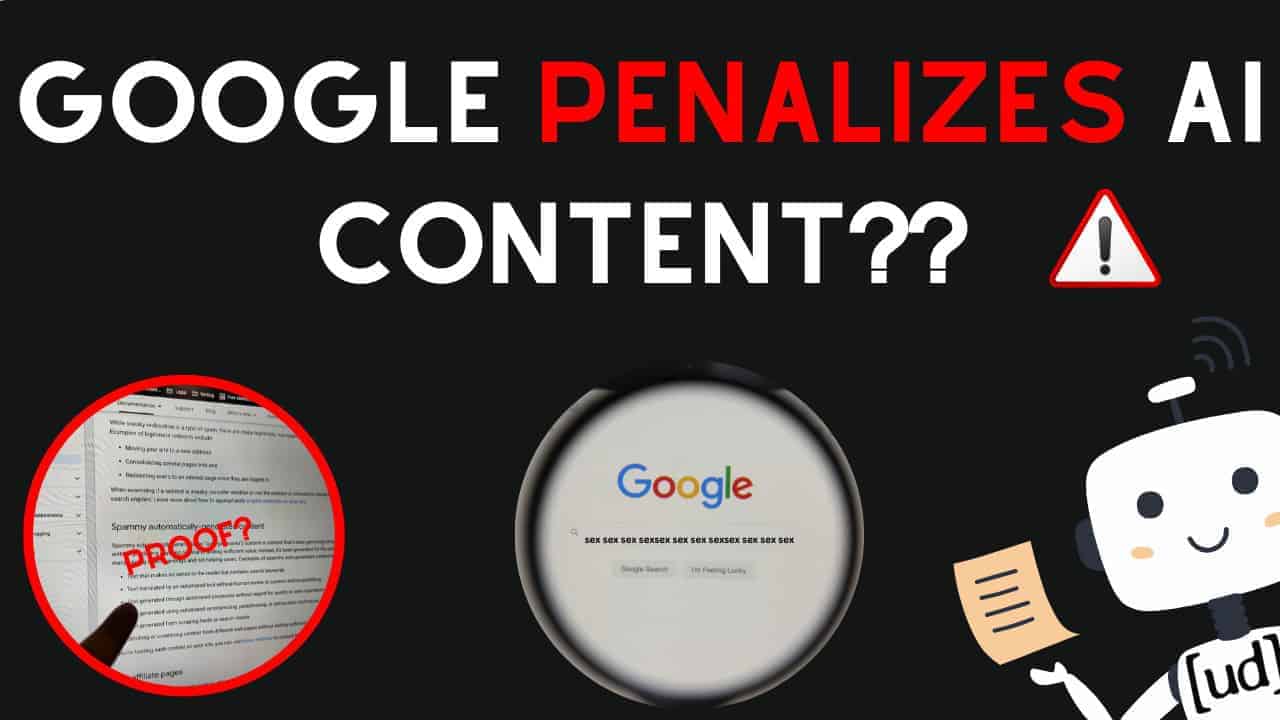In today’s rapidly evolving digital landscape, new technologies continue to shape and redefine diverse aspects of our lives – including how we generate and perceive online content.
Amongst the most significant of these technologies is Artificial Intelligence (AI), which has introduced an innovative way of creating content dynamically.
Consequently, this has become a focal point for most SEO agencies who are seeking to maintain their competitive edge.
This article delves into the intricate dynamics between AI-written content and Google’s search algorithm.
It explores questions knotted around whether Google penalize AI content in search results or not, the myths surrounding any potential penalties, and how using this type of content affects SEO strategies.
Furthermore, we explore how innovative services like Undetectable AI can play a vital role in mediating penalties and ensuring that your SEO strategy maintains its integrity.
As Google’s search algorithm continues to evolve, staying ahead of transformations and adjusting strategies accordingly forms the cornerstone of successful SEO practices.
This article is the guide you need to navigate the complex interplay between AI content and Google’s algorithm.
Understanding Google’s Algorithm: How AI Written Content is Treated?
Before getting into how Google evaluates AI-produced content, we must first comprehend Google’s search algorithm.
Google’s task is to provide the most reliable, pertinent, and high-quality content possible in response to a user’s search.
This involves assessing and indexing billions of pages using a complex and frequently updated algorithm.


Never Worry About AI Detecting Your Texts Again. Undetectable AI Can Help You:
- Make your AI assisted writing appear human-like.
- Bypass all major AI detection tools with just one click.
- Use AI safely and confidently in school and work.
When it comes to AI-written content, Google’s algorithm views it the same as it does any other content – through the lens of quality, relevance, and uniqueness.
A Close Look at Google’s Search Algorithm and Its Perception of Original Content
Google’s Search Algorithm is nuanced and dynamic, optimized to recognize original, high-quality content for providing the ideal user experience.
It values authoritative and unique material that offers informative insights to the audience, reflecting a profound understanding of how search engine algorithms respect originality in content.
By using web crawlers, Google continually searches and indexes content based on keyword relevance, link quality, and overall site trustworthiness.
The importance is clear in ensuring your content, AI-created or human, upholds these principles for better search engine results page (SERP) rankings and to align with Google’s perception of original content.

Evaluating Quality: How Google Algorithm Interprets AI-Generated Content
The evaluation of the quality of AI-generated content by Google’s algorithm hinges on several key factors.
Essentially, Google’s search algorithms prioritize content that provides robust and meaningful information to users. AI-written content is subject to the same standards of readability, depth of research, relevance, and user engagement as human-written content.
It is crucial to note that the indiscriminate injection of keywords into the AI-generated material might harm the quality score accorded by Google’s bots. Rather, a strategic approach using long-tail keywords and phrases, audience-specific content, and high informational value can help attain a higher rank on Google’s SERPs.
The Importance of Relevance in AI Produced Content According to Google’s Algorithm
Google’s algorithm places a substantial emphasis on the relevance of AI produced content in determining search rankings.
The importance of well-researched, topic-specific content cannot be overstated, as it’s a key determinant in meeting the audience’s search intent.
Specific long-tail keywords including ‘contextual relevance in AI content’, ‘topical relevance for Google algorithm’, ‘relevance of AI-created content’, and ‘search intent relevance of AI-produced content’, play a vital part in achieving this.
Hence, mimicking human ability to cater to the nuanced queries of users is pivotal in creating AI-generated content that aligns perfectly with Google’s focus on relevance.
Deciphering the Role of Uniqueness in Google’s Assessment of AI-Created Content
Google’s algorithm takes into account the uniqueness of the content, and this holds for AI-generated content as well.
With modern AI’s capacity to create distinctive pieces, copied or plagiarized material stands out to Google’s spiders, causing detrimental SEO results.
It’s important for AI SEO content strategies to avoid duplicate content issues and to consistently generate unique valuable information for optimal audience engagement.
Remember, for Google, uniqueness isn’t just avoiding copying and pasting. It’s about bringing fresh perspectives, engaging insights, and informational value to the table in a way that hasn’t been done before.
Hence, leveraging AI writing tools that maintain originality can lead to favorable Google search rankings.
Impact of Using AI-Generated Content for SEO Strategies
The rise of AI-written content has stirred up a lot of debate in the world of SEO ranging from its benefits to its potential drawbacks.
This new technology holds great promise for companies aiming to streamline their content creation processes but it’s important to understand how it can bear an impact on SEO strategies before integrating it into your marketing plans.
Elevating Biz’s Productivity: Harnessing the Potential of AI for Content Creation
Artificial Intelligence (AI) holds immense power in redefining the traditional content creation process, significantly boosting a business’s productivity.
With the help of AI-powered automation tools, businesses can eliminate time-consuming tasks of drafting, editing, and organizing content.
For instance, AI content writing solutions such as Jarvis or OpenAI’s GPT-3 can generate high-quality articles, blog posts, or product descriptions in mere minutes.
These tools are equipped with natural language generation (NLG) that can write human-like content, freeing up significant time for marketers and writers for more strategic tasks.
Thus, harnessing the potential of AI can catapult businesses to new heights of productivity and efficiency.
Fostering Search Engine Optimization: Role of AI-Generated Content in Boosting Rankings
AI-generated content can play a pivotal role in bolstering search engine rankings.
By harnessing the power of AI, businesses can streamline their content creation process, ensuring that their content is regularly updated with relevant, keyword-rich, and SEO-optimized text.
This not only increases their chances of being discovered in organic search results but also establishes their authority in their respective niches.
Moreover, AI can analyze massive data sets to identify popular trends and top-performing content, helping businesses to tailor their content strategy accordingly.
Hence, AI-written content is instrumental in mastering the evolving SEO landscape, achieving high Google rankings, and driving increased web traffic.
Navigating SEO Challenges with AI: Mitigating Risks of Google Penalties
With AI-generated content, navigating SEO challenges can be daunting due to the risk of incurring Google penalties.
Fortunately, savvy use of AI can help mitigate such risks.
By leveraging AI for SEO, ensuring the produced content is original, high quality, relevant to the query, and free of keyword stuffing, websites can avoid triggering Google’s spam detection.
Quality control in AI-generated content can significantly reduce the likelihood of penalties.
Furthermore, keeping abreast of updates to Google’s algorithm can guide modifications to the AI content creation process, thus maintaining alignment with Google’s SEO best practices.
AI & SEO Symbiosis: Exploring the Advancements in AI Content Generation & its SEO Implications
In the rapidly evolving digital landscape, AI and SEO are forming a dynamic duo, creating a symbiosis that significantly impacts digital marketing and content creation strategies.
Advanced AI content generation tools are setting new benchmarks in creating high-quality, SEO-friendly content, organically integrating highly searched long-tail keywords.
These advancements are not just streamlining the content creation process but also supercharging the SEO game by skilfully avoiding risks of Google penalties and driving higher organic traffic.
As AI writing tools continually evolve, so do their implications in SEO, creating new opportunities and challenges for marketers and SEO professionals.
Does Google Classify AI-Written Content as Spam?
In the realm of search engine optimization, questions abound regarding the potential classification of AI-generated content as spam by Google.
This is a critical concern given that, if true, it could detrimentally impact a site’s ranking.
However, it’s essential to delve deeper into this topic and shed light on various facets often understated or overlooked.
Is AI-Generated Content Viewed as Keyword Spamming by Google?
Google’s perspective on AI-generated content is well-structured; it isn’t about the means of creation, but about the quality and relevance of the content.
AI-written content comprising a high density of keywords, devoid of value or context might be misconstrued as keyword spamming.
However, a content that is peppered with relevant, long-tail high traffic keywords, which provides meaningful information to readers may not be viewed as spam.
If the artificial intelligence used in creating content ensures informativeness, natural readability, and coherent keyword usage, Google’s algorithm is less likely to classify it as spam.
Thus, responsible usage of AI technology can indeed minimize the risk of Google penalties.
Understanding Google’s Algorithm: Its Stance on Automated Content Generation
Google’s algorithm, a closely guarded secret in the tech world, has a specific stance on automated content generation.
Google’s primary aim is to deliver useful, relevant, and high-quality content to its users. As a result, the algorithm favors content with real value over AI-generated or spun content, which can often be generic or repetitive.
However, Google doesn’t explicitly penalize AI-generated content unless it falls into the spam category, provides no value, or is duplicate content.
Consequently, quality, originality, and user-focused AI-generated content can potentially rank well in Google’s Search Engine Results Pages (SERPs).
AI Content Versus Human-Generated: Assessing the Risk of Google’s Anti-Spam Measures
The comparison between AI content and human-generated content becomes crucial when assessing the potential risk of falling foul of Google’s anti-spam measures.
For businesses keen on leveraging AI for generating content for SEO strategies, it’s imperative to understand how Google’s algorithm works to ensure the AI-generated content doesn’t trigger spam alerts.
When shaping AI-centered content strategies, the focus should not only be on churning high volumes of content but also on maintaining the quality and relevance to pass Google’s stringent anti-spam scrutiny.
As much as AI can enhance productivity, SEO professionals need to tread carefully to maintain a good balance between AI-assisted efficiency and the distinctive value offered by human creativity.
Detailed Insight: How Google Detects and Reacts to AI-Created Content Spam
Google has sophisticated measures in place to detect AI-generated content spam.
The search engine’s algorithm is equipped with advanced techniques to identify artificially fabricated content, primarily by looking for inconsistent language patterns, keyword stuffing, and irrelevant or repetitive phrases.
Whenever such instances are discovered, the algorithm may downrank the website or, more seriously, issue a Google penalty for the violation.
Hence, ensuring reliability, uniqueness, quality, and relevancy in AI-generated content is paramount to stay in Google’s favor and avoid adverse SEO implications.

Ensuring High-Quality AI Written Content vs Human Written Content: A Comparison
With the emergence of Artificial Intelligence (AI) in technology advancements, the debate about the quality, efficiency, and value of AI-generated content in comparison to human-written material has become significant.
AI-based writing tools are rapidly becoming popular in many industries, including digital marketing.
This section sheds light on the multifaceted debate of AI-Written Content vs. Human Written Content, diving into specifics such as readability, authenticity, SEO optimization, and the human touch.
The Art of Readability: AI-Generated Content VS Human-Written Prose
There’s an undeniable charm in human-written prose, nurturing an immediate connection with readers, encompassing intricate emotions, fluidity, and nuanced tone of voice that may initially appear irreplicable by AI content generators. However, with advancements in technology, AI-generated content has risen to the challenge, leveraging machine learning and natural language understanding to produce clear, precise, and easy-to-read pieces. It’s not about AI vs human content creation, but rather how AI writing tools can mirror human-like readability, engaging readers with well-structured sentences, and striking the perfect balance between captivating storytelling and technical writing, thereby playing an integral role in content marketing strategies.
Authenticity Factor: Human Perspective versus AI Algorithms in Content Writing
Human-written content often carries a unique flair of authenticity capturing real emotions, experiences, and insights that can deeply resonate with readers.
This originates from the writer’s personal perspective, understanding, and interpretation of a topic.
On the other hand, AI algorithms generate content based on accumulated data, which might sometimes lack that human perspective and emotional context.
However, advanced AI tools are striving to deliver near-human-like authenticity in content writing, using language models that mimic the complexity and texture of human language.
The effectiveness of AI content greatly depends on how it’s programmed and the quality of data fed into it.
SEO Optimization: AI-Generated Content Tactics versus Human SEO Strategies
As online businesses vie for higher search engine rankings, the debate between AI-generated content tactics and human SEO strategies takes center stage.
AI content generation tools like GPT-3 have introduced new approaches to SEO optimization, leaning heavily towards data-driven keyword usage, accurate meta-tags, and structured formatting.
On the other hand, human SEO strategies bring a more intuitive understanding of trending keywords, searcher intent, and the semantic context of keyword use.
However, the potential lies in combining AI’s computational prowess with human SEO acumen, for a synthesis that leverages artificial intelligence advancements and human creativity for optimal website visibility.
Empathy and The Human Touch: How AI-Written Content Measures Up
When it comes to adding empathy and a human touch in content, AI-generated content is often under scrutiny.
While AI has harnessed immense capabilities, mimicking human emotions accurately remains a challenge.
AI-written content, though impressive in many aspects, often falls short in resonating with human emotions, an element that’s critical for fostering a deep connection with readers.
However, continuous advancements in machine learning are progressively enabling AI to improve its empathetic quotient, although it’s still a stretch to expect them to replicate the intuitive understanding of a seasoned human writer.
The Consequences of Utilizing AI Content Without Google Guidelines in Mind
When it comes to using AI-generated content, it is crucial to stay informed about Google’s guidelines. Disregarding them can have grave consequences.
This is not to frighten users of AI content creation tools, but to emphasize the importance of adhering to prescribed guidelines to ensure success in SEO strategies and to prevent penalization from search engines.
Remember, the main purpose of SEO is to enhance user experience, and Google won’t take kindly to any practice that compromises that.
The Risks of Overlooking Google’s SEO Guidelines for AI Content
Overlooking Google’s SEO guidelines for AI content can pose significant risks to your website’s ranking, leading to diminished online visibility.
The repercussions of deploying AI-generated content without proper adherence to SEO practices can involve penalties, deranking, and ultimately loss in organic traffic.
In particular, content that is seen as low-quality, irrelevant, or spammy can be flagged by Google’s crawling algorithm.
Hence, it’s paramount for businesses to understand these guidelines and meticulously implement AI in their SEO strategies to avoid such potentially disastrous pitfalls.

Impact of Non-compliant AI Content on your Website Ranking
Failing to abide by SEO guidelines when using AI-based content can gravely dent your website’s ranking.
Incorporating non-compliant AI content can trigger Google’s algorithm, identifying your site as hosting low-value or duplicated content, thereby pushing it down the SERPs.
The repercussions for disregarding regulations like keyword stuffing, unnatural language or spammy links are far-reaching, often reducing organic traffic and compromising digital visibility.
Carefully navigating automated content production is critical to maintain a strong online presence while leveraging AI’s benefits for efficient content creation.
Always aim for high-quality, unique and value-laden AI-written content that aligns with Google’s SEO standards.
Addressing Google Penalties for AI-Generated Content Misuse
It’s no secret that misuse of AI-generated content can lead to Google penalties.
Addressing these penalties entails understanding the root causes, with duplicate content and keyword stuffing being the foremost culprits.
SEO strategies incorporating AI should strike a fine balance, ensuring content lends value to readers while also conforming to Google’s regulations.
These penalties not only mar your digital reputation, but significantly lower SERP rankings.
The key to overcoming such Google penalties associated with AI-generated content lies in diligent monitoring, consistent quality checks, and timely rectification of AI content generation practices.
Long-term Effects of Using AI Content without Considering Google’s Algorithms
Opting to continually use AI content without aligning strategies to Google’s algorithms can create long-standing negative impacts on your digital marketing strategy.
This cavalier approach not only risks abrupt Google penalties and severe drops in SERP rankings but also impedes your organic visibility, ultimately affecting your trust factor amongst the visitor base over time.
Additionally, operating without considering Search Engines’ mechanisms may also lead to a diminished return on investment (ROI) for your SEO efforts, as ineffective keyword use and low-value content can deter coveted web traffic.
Hence, respecting the pivotal role of Google’s algorithms is indispensable when adopting AI for content generation.
Preventing Google’s Penalty for AI Content: Role of Undetectable AI
AI-written content is often looked at with skepticism due to concerns that Google might penalize it.
Although AI-generated content can sometimes be deemed as low-value or possibly spammy, it is possible to prevent such penalties by leveraging the power of Undetectable AI.
This kind of AI can produce high-quality, unique content that provides value to readers, making it indistinguishable from human-written pieces.
The Landscape of Undetectable AI in Content Production: A Necessity for SEO Survival
With the rising sophistication in machine learning algorithms, Undetectable AI has become a crucial element in content production, essential to maintaining SEO survival and garnering high-quality organic traffic.
Companies facing stiff competition in the digital landscape are now using Undetectable AI as an innovative tool to create diverse, unique, and engaging content that ranks highly on search engine results while maintaining adherence to Google’s algorithmic rules.
This cutting-edge AI-powered technology can effectively mimic human-like content writing abilities, creating a pivotal shift in content marketing strategies, thus helping businesses remain resilient and thrive amidst SEO changes and challenges.
Enhancing Content Quality with Undetectable AI: An Effective Prevention against Google’s Penalty
Ghostwriting with AI, if done correctly, can enhance content quality substantially, leading to a higher SEO rank.
Use of stealthy, Undetectable AI is a promising trend in digital marketing and content creation that can result in content that is perceived to be human-generated, thereby sidestepping Google’s penalties for AI-written content.
Integrating high-quality, unique, and Undetectable AI-generated content into your digital marketing strategy leads to enriched website authority, viewer engagement, and organic traffic while strictly adhering to Google’s SEO guidelines.
Hence, optimizing your AI tool to be untraceable yet high in quality is an effective way of avoiding Google’s sanctions.
Navigating SEO Strategies: The Key Role of Undetectable AI in Evading Google Penalties
Plotting a successful SEO strategy requires mindful navigation and employing the power of Undetectable AI is a prime asset in this journey.
Sophisticated AI tools can artfully embed long-tail keywords, improve content readability, and ensure user engagement without raising red flags for Google penalties.
Leveraging AI-based content creation, while maintaining authenticity and uniqueness, can subtly enhance your organic ranking, drive more targeted traffic, and deliver an impressive return on investment.
Essentially, Undetectable AI is an indispensable enabler when it comes to advancing your brand’s visibility and credibility, all while keeping in compliance with Google’s constantly evolving algorithms.
Undetectable AI: An Unseen Ally for SEO Success and Google Penalties Evasion
Leveraging the power of Undetectable AI in SEO strategies has evolved as an inevitable necessity in today’s digital landscape.
This unseen ally not only aids in producing high-quality, unique content that Google’s algorithm favors, but also aids in evading potential penalties or SEO transgressions.
The seamless capabilities of transparent AI, in generating SEO-friendly, reader-engaging content that is indistinguishable from human-produced versions, is drastically reshaping the future of content marketing and SEO approaches.
It’s crucial to harness this potential wisely to ensure SEO success while staying penalty-free in Google’s dynamic, ever-evolving search environment.
Boosting Your SEO Success: Adopting AI-Powered Content with Undetectable AI
Adopting AI-powered content into your SEO strategy can indeed provide your business with a significant boost.
Incorporating artificial intelligence in your content generation process can result in high-quality, SEO-optimized articles that not only engage the audience but also stay in line with Google’s search algorithm.
But, it’s crucial for it to be implemented rightfully, and using Undetectable AI can ensure that.
The key lies in seamlessly blending machine-generated inputs with human creativity, effectively making the AI involvement undetectable, thus avoiding any potential penalties.
Understanding the Benefits of AI-Powered Content Generation
Adopting AI-powered content generation presents myriad benefits such as streamlining the production process, creating high volumes of uniform content, and saving significant amounts of time and resources.
Harnessing the potential of AI in content creation, digital marketers can effectively target long-tail keywords and enhance website’s SEO, thus improving visibility and organic traffic.
Particularly in an era of content is king, leveraging machine learning technologies in creating SEO-friendly, high-quality, and consistent content can be a game-changer for your digital marketing efforts.
Striking the Balance: When Machine Meets Human Creativity
When it comes to creating AI-powered content, striking the optimal balance between machine efficiency and human creativity is crucial.
With the right blend, your artificial intelligence SEO strategy will result in high-quality, engaging content that maintains a genuine human touch – a feature Google greatly values.
By leveraging AI for laborious tasks such as keyword research, companies can free their creative teams to focus on crafting compelling narratives – synergizing human creativity with AI efficiency.
Thus, a harmonious collaboration between man and machine can take SEO practices to the next level, amplifying organic traffic and user engagement on your site.
Avoiding SEO penalties: The Paramount Importance of Undetectable AI
For a successful SEO strategy, it’s crucial to avoid falling foul of SEO penalties, and here lies the importance of Undetectable AI.
By generating unique, value-rich content that aligns with Google’s SEO guidelines, AI tools can seamlessly integrate into your content creation process, avoiding potential disadvantages and the risk of penalties.
Leveraging Undetectable AI, your business can benefit from a complex blend of machine efficiency and human creativity, creating content that engages users, enhances website visibility, and maintains a robust, SEO-friendly online presence.
Therefore, Undetectable AI presents an indispensable tool in modern SEO strategies, ensuring Google Algorithm compliance and penalty avoidance.
Strategic Incorporation of AI into Your SEO Practices for Increased Traffic
Strategic incorporation of AI into SEO practices can significantly improve your organic traffic and SERP rankings.
Utilizing AI-driven content creation tools that understand the nuances of keyword usage, can help deliver SEO-friendly content that acutely satisfies user intent.
With AI’s ability to comprehend and predict search engine algorithm changes, you can stay agile, constantly adapt to SEO trends, and outrank competitors with high-quality, optimized content.
From long-tail keyword searches to optimized meta descriptions, the strategic use of AI in SEO practices could revolutionize your digital marketing strategy.

Towards Misconception-Free SEO: Dismantling Myths About AI and Google Penalties
In the world of Search Engine Optimization (SEO), there are many misconceptions surrounding artificial intelligence (AI) and the supposed penalties that Google imposes on AI-generated content.
These myths can lead to confusion and unnecessary apprehension regarding the utilization of AI in content creation.
This section of our article aims to debunk these misconceptions and provide clear, factual information on the subject.
Unpacking the Misconception: Is AI content really Black Hat SEO?
There is a common misconception that utilizing AI-generated content amounts to black hat SEO practices, but this is far from the truth.
While black hat SEO involves tactics that deliberately manipulate search engine indexes, AI content creation serves to improve efficiency and productivity of the labor-intensive content generation process.
AI content creation tools, like autonomous SEO content generators, can indeed create high-quality, SEO-friendly, unique articles, which aids in supporting white hat SEO strategies.
The artificial intelligence in SEO’s role is not to cheat search engines, but to evolve with them, offering high-value content aligned with users’ search intent.
Debunking the Myth: AI and Google Manual Action Penalties
Manual action penalties from Google are a significant concern for many SEO professionals and content creators, particularly in the era of AI-generated content.
However, it’s critical to understand the truth behind these fears.
Google does not automatically impose manual action penalties on AI-written content.
The focal point remains on the value the content provides to its readers, regardless of who – or what – has written it.
As long as your AI-powered content adheres to Google’s Webmaster Guidelines, focusing on generating valuable, unique, and user-friendly content, the fear of enduring manual action penalties is largely unfounded.
Understanding Google’s View: AI Content and Algorithmic Adjustments
Understanding Google’s perspective on AI content and its algorithmic adjustments is crucial for effective SEO strategies.
Google’s complex ranking algorithms aren’t inherently prejudiced against AI-generated content.
However, the emphasis always lies upon the content’s quality, relevance, and uniqueness.
Google’s algorithm updates, including Panda, Penguin, or the latest BERT, are aimed at rooting out poor-quality content, not specifically targeting AI-produced articles.
Thus, AI-created content can certainly hold its ground, provided it meets these quality standards and maintains optimal keyword density, and steer clear of keyword stuffing or any other black hat SEO tactics.
Setting the Record Straight: AI Content Does Not Equal Low Quality Spam
Over the years, a persistent misconception has been that AI content equates to low quality spam, which is far from the truth.
With advancements in artificial intelligence, algorithmic design and machine learning capabilities, AI is now capable of creating high-quality, plagiarism-free content that caters to your audience’s needs effectively.
Today’s AI content creation tools are designed with the latest SEO strategies in mind, ensuring that the content not only provides value to the reader but also aligns with search engine guidelines to boost SERP rankings.
Thus, AI-generated content and spam do not even belong in the same sentence.
Frequently Asked Questions: Does Google Penalize AI Generated Content?
1. How does Google’s algorithm treat AI-generated content?
Google’s algorithm evaluates AI-generated content the same way it assesses human-written content.
It considers factors such as the relevance of content, quality of information presented, the uniqueness of content, and user engagement level.
As long as the content satisfies these criteria, there’s no cause for penalization.
2. Can AI-generated content enhance SEO results?
Yes, AI-generated content can certainly enhance SEO results.
AI has the capacity to analyze vast amounts of data and recognize trends, leading to content creation that complements SEO strategies by incorporating keywords and satisfying user intent effectively.
However, it’s crucial for the AI written content to maintain high levels of quality, relevance and uniqueness.
3. Does Google classify AI-generated content as spam?
Google does not necessarily classify AI-generated content as spam. It all depends on the quality of the content.
If the AI is creating repetitive, irrelevant or low-value content, Google may classify it as spam.
That’s why it’s important to ensure your AI tool is creating high-quality and unique content.
4. How does the quality of AI-written content compare to human-written content?
AI-written content can often match, and in some areas, even excel over human-written content in terms of quality. From analyzing larger data sets to incorporating SEO trends swiftly, AI has significant advantages. However, there exist content areas like emotional appeal and creativity where human content might outshine AI. Thus, a combination of AI and human-written content often results in optimal outcomes.
5. How can one prevent Google’s penalties when using AI-written content?
Preventing Google penalties when using AI-written content requires adherence to Google’s guidelines which emphasize the creation of unique, high-quality, and user-focused content.
Undetectable AI can be a useful tool here, ensuring the content produced is indistinguishable from human-written pieces, thereby evading potential penalties.
6. Is AI-written content beneficial for SEO?
AI-written content can be extremely beneficial for SEO strategies.
AI excels at replicating patterns and analyzing big data, making it ideal for recognizing successful SEO trends and automating keyword implementation.
With the help of Undetectable AI, the content generated is high-quality, reader-friendly, and fully complements an effective SEO strategy.
7. Is there a misconception about Google penalties and AI-written content?
There are indeed some misconceptions about Google’s penalties and AI-written content.
Some believe that Google will automatically penalize AI-written content, which is not true.
Google’s primary concern is the value provided to its users, regardless of whether the content was created by a human or AI.
As long as the content is of high quality, unique, and relevant, Google does not penalize it.
Wrapping Up: Unveiling the Truth About Google’s Take on AI-Generated Content
In conclusion, Google does not inherently penalize AI-generated content.
The algorithm’s primary goal is to provide the most relevant, valuable, and high-quality results for users, regardless of whether the content comes from a human author or AI.
It’s crucial, however, to ensure the AI-written content is unique, relevant and offers value.
An SEO strategy that leverages AI content can, indeed, reap significant benefits provided it aligns with these fundamental criteria.
That’s where solutions like Undetectable AI come into play.
This sophisticated technology can help create high-quality, unique, and relevant content that seamlessly aligns with human writing style, ensuring the AI’s involvement remains undetectable and henceforth, penalty-free by Google.
It’s the perfect tool to enhance your content marketing strategy by ensuring maximum user value while maintaining efficiency and SEO relevance.
Explore the potential of Undetectable AI today and redefine your content creation with an innovative AI solution that prioritizes quality, user relevance and stays one step ahead of Google’s ever-evolving algorithms.
Let’s usher your SEO journey towards newer heights of success. Step into the future of content generation today with Undetectable AI!
